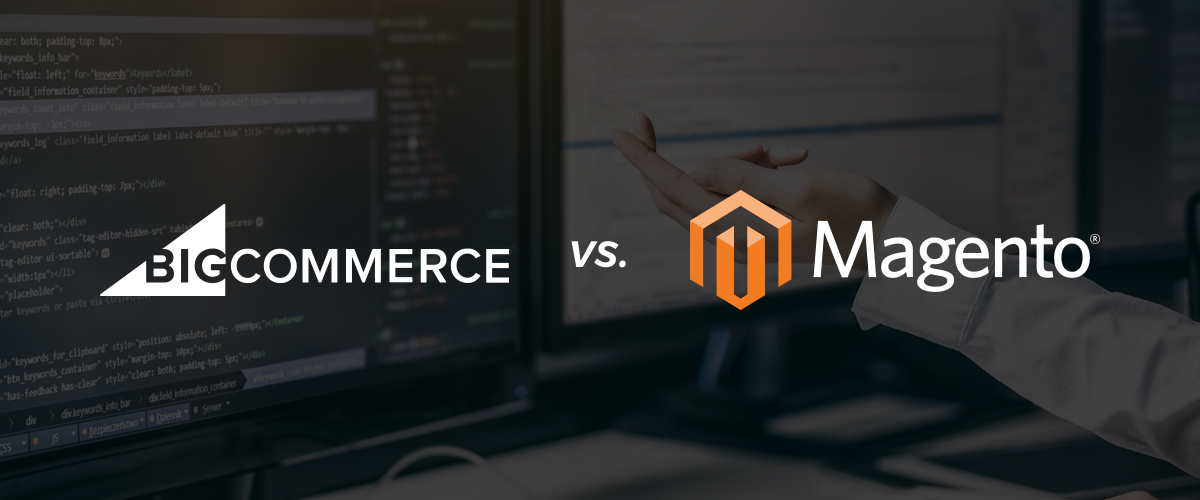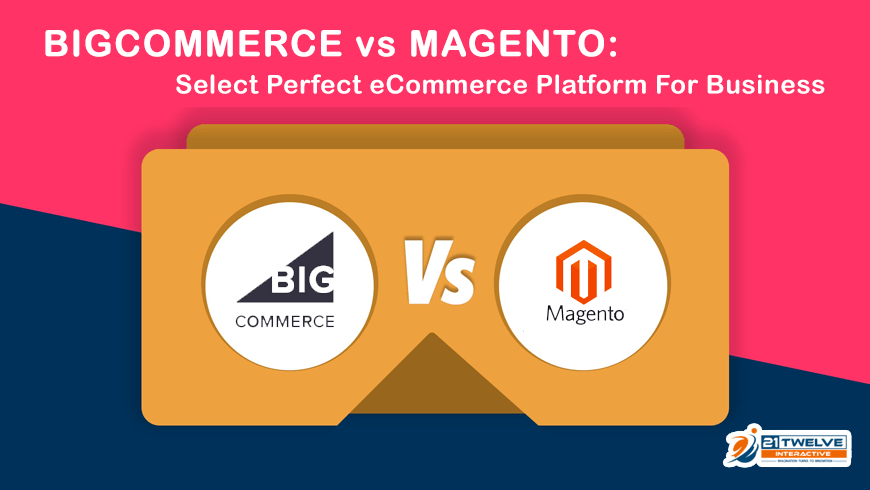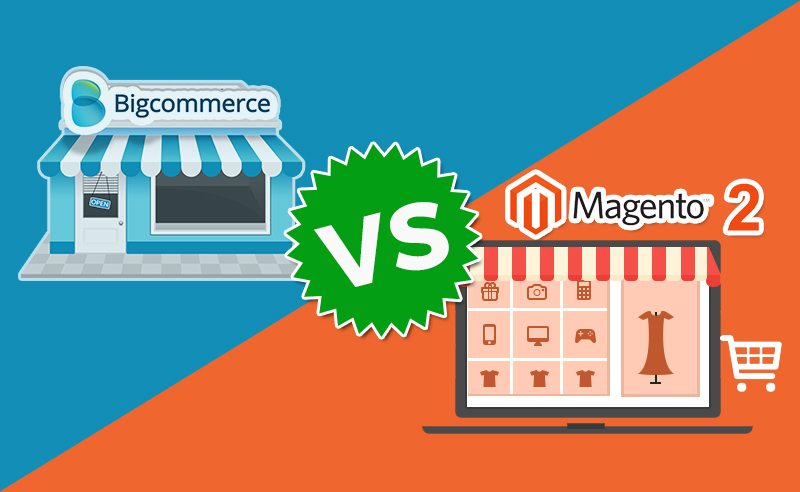BigCommerce vs Magento 2: Which Ecommerce Platform Scales Better?

In the realm of ecommerce platforms, the comparison between BigCommerce and Magento 2 on scalability becomes a focal point. This introduction sets the stage for a deep dive into the world of online retail, promising a comprehensive and insightful exploration of these two leading solutions.
Introduction

BigCommerce and Magento 2 are two popular ecommerce platforms that businesses often consider when setting up their online stores. BigCommerce is a cloud-based solution known for its user-friendly interface and comprehensive features, while Magento 2 is an open-source platform favored for its flexibility and customization options.Choosing a scalable ecommerce platform is crucial for businesses looking to grow and expand their online presence.
Scalability refers to the ability of a system to handle increased workload or growth without compromising performance. In the context of ecommerce, scalability ensures that a platform can accommodate a growing number of products, customers, and transactions without encountering issues such as slow loading times or system crashes.
Importance of Scalability in Ecommerce Growth
Scalability plays a vital role in the success of an ecommerce business, especially as it grows and attracts more customers. Here are some key points highlighting the significance of scalability in the context of ecommerce growth:
- Handle Increased Traffic: A scalable ecommerce platform can manage a higher volume of website visitors, especially during peak seasons or promotional events, without experiencing downtime or performance issues.
- Support Growing Product Catalog: As businesses expand their product offerings, a scalable platform can easily accommodate a larger inventory without affecting site speed or navigation.
- Improve User Experience: Scalability ensures that customers can browse products, make purchases, and complete transactions smoothly, leading to higher satisfaction and increased sales.
- Facilitate Business Expansion: With a scalable platform, businesses can easily scale their operations, enter new markets, and adapt to changing business needs without facing limitations imposed by the ecommerce platform.
Features Comparison
When choosing an ecommerce platform, it is essential to consider the key features that will impact your business's success. Let's compare the features of BigCommerce and Magento 2 to help you make an informed decision.
Customization Options
Customization options are crucial for tailoring your online store to fit your brand and meet your specific needs. BigCommerce offers a user-friendly drag-and-drop interface, making it easy to customize your website design without needing extensive coding knowledge. On the other hand, Magento 2 provides a high level of customization through its open-source platform, allowing developers to create unique and complex functionalities for your store.
Third-Party Integrations
Integrating with third-party tools and services can enhance the functionality of your ecommerce store. BigCommerce has a wide range of built-in integrations with popular payment gateways, shipping providers, and marketing tools, making it easy to connect with external services. Magento 2 also offers a vast marketplace of extensions and integrations, allowing you to expand your store's capabilities with various add-ons and plugins.
Capabilities
Search engine optimization () is crucial for driving organic traffic to your online store. BigCommerce includes built-in features such as customizable URLs, meta tags, and sitemaps to help improve your store's visibility in search engine results. Magento 2 also provides robust tools, allowing you to optimize product pages, category pages, and content for better search engine rankings.
Mobile Responsiveness
With the increasing use of mobile devices for online shopping, having a mobile-responsive ecommerce website is essential. BigCommerce offers mobile-responsive themes that ensure your store looks and functions seamlessly on all devices, providing a smooth shopping experience for mobile users.
Magento 2 also prioritizes mobile responsiveness, allowing you to create mobile-friendly designs and optimize your store for mobile users.
Performance Metrics
When evaluating the scalability of ecommerce platforms like BigCommerce and Magento 2, performance metrics play a crucial role. These metrics provide insights into how well a platform can handle an increasing number of users and transactions over time.Page Load Speed:One of the key performance metrics is page load speed, which refers to how quickly a webpage loads when accessed by a user.
Faster page load speeds are essential for providing a seamless shopping experience and reducing bounce rates. Platforms that can deliver fast page load speeds even under heavy traffic conditions are considered more scalable.Uptime:Uptime is another important metric that measures the percentage of time a platform is operational and accessible to users.
High uptime ensures that customers can access the online store whenever they want to make a purchase. Ecommerce platforms with high uptime rates are better equipped to handle increased demand and scale effectively.Concurrent User Handling:The ability to handle a large number of concurrent users is a critical performance metric for scalability.
Platforms that can efficiently manage multiple users accessing the site simultaneously without experiencing slowdowns or crashes are considered highly scalable. This metric is indicative of how well a platform can accommodate growth without compromising user experience.Why Performance Metrics are Crucial:Performance metrics are crucial for determining scalability because they directly impact the user experience, conversion rates, and overall success of an ecommerce platform.
By analyzing metrics like page load speed, uptime, and concurrent user handling, businesses can identify potential bottlenecks, optimize performance, and ensure that their platform can grow sustainably. Ultimately, measuring and improving these performance metrics is essential for achieving long-term scalability and success in the competitive ecommerce landscape.
Flexibility and Customization
When it comes to building an ecommerce website, flexibility and customization play a crucial role in creating a unique and scalable online store. Let's delve into how BigCommerce and Magento 2 differ in terms of flexibility and customization options.
BigCommerce
BigCommerce offers a user-friendly interface that allows users to customize their online store without the need for extensive coding knowledge. Some key customization options available on BigCommerce include:
- Customizable themes and templates to create a visually appealing storefront
- Drag-and-drop design tools for easy customization of layouts and content
- Integration with third-party apps and extensions to add additional functionality to the store
- Flexible product options and pricing rules to tailor the shopping experience for customers
Magento 2
Magento 2 is known for its high level of customization and flexibility, making it a popular choice for large enterprises and businesses with complex ecommerce needs. Some customization options available on Magento 2 include:
- Full access to the codebase for complete control over the design and functionality of the online store
- Ability to create custom extensions and modules to add unique features to the website
- Support for multiple storefronts and languages, ideal for businesses operating in different regions
- Advanced product configuration options, such as bundled products and configurable products
Flexibility in customization allows ecommerce businesses to adapt to changing market trends, customer preferences, and business requirements. By having the ability to tailor the online store to specific needs, businesses can create a seamless shopping experience for customers, ultimately contributing to the scalability of the ecommerce website.
Scalability Solutions

When it comes to scalability solutions, both BigCommerce and Magento 2 offer tools and resources to help businesses grow and expand their online presence. Let's delve into how each platform facilitates scalability as businesses evolve.
BigCommerce Scalability Solutions
BigCommerce provides a range of scalability solutions to help businesses manage growth effectively. Some key features include:
- Automatic Scaling: BigCommerce offers automatic scaling to handle increases in traffic and demand without any manual intervention required.
- Elastic Search: This feature ensures fast and reliable search functionality, even as the number of products and customers grows.
- Flexible Infrastructure: BigCommerce's cloud-based infrastructure allows for easy scaling up or down based on business needs.
Magento 2 Scalability Solutions
Magento 2 also offers robust scalability solutions to support businesses as they expand. Here are some of the key tools and resources available:
- Horizontal Scaling: Magento 2 supports horizontal scaling, allowing businesses to add more servers to distribute the load and handle increased traffic efficiently.
- Caching Technologies: Magento 2 leverages advanced caching technologies to optimize performance and ensure smooth operation even during peak traffic times.
- Cloud Deployment: Businesses can choose cloud deployment options with Magento Commerce Cloud for enhanced scalability and flexibility.
Case Studies
In this section, we will explore case studies of businesses that have successfully scaled using BigCommerce and Magento 2. By analyzing the strategies implemented by these companies, we can gain insights into how these platforms facilitate scalability for online businesses.
BigCommerce Success Stories
- One example of a company that has benefited from scaling with BigCommerce is Skullcandy, a popular audio accessories brand. By leveraging BigCommerce's robust features and scalability solutions, Skullcandy was able to expand its online presence and increase sales significantly.
- Another success story is Ben & Jerry's, the famous ice cream brand. By utilizing BigCommerce's flexible and customizable platform, Ben & Jerry's was able to create a seamless online shopping experience for customers, leading to improved conversion rates and revenue growth.
Magento 2 Success Stories
- One notable example of a company that has successfully scaled using Magento 2 is Nike. By harnessing Magento 2's powerful e-commerce capabilities, Nike was able to create a personalized and engaging online shopping experience for customers, resulting in increased customer loyalty and retention.
- Another company that has thrived with Magento 2 is Helly Hansen, a well-known outdoor gear brand. Helly Hansen utilized Magento 2's scalability solutions to expand its product offerings and reach a wider audience, leading to a significant boost in online sales.
By examining these case studies, we can see that both BigCommerce and Magento 2 have enabled businesses to achieve scalability through features like customization, performance optimization, and flexibility. These success stories highlight the importance of choosing the right e-commerce platform to support the growth and expansion of online businesses.
Closing Summary

As we conclude our examination of BigCommerce vs Magento 2: Which Ecommerce Platform Scales Better?, the key takeaways are neatly summarized, leaving readers with a clear understanding of the scalability factors at play in this dynamic market.
FAQ Compilation
What are the key differences between BigCommerce and Magento 2?
BigCommerce is a hosted solution, while Magento 2 is a self-hosted platform. BigCommerce offers more out-of-the-box features, whereas Magento 2 provides advanced customization options.
How do scalability metrics impact the choice between BigCommerce and Magento 2?
Metrics like page load speed and uptime affect user experience and overall performance, influencing scalability decisions.
What are some examples of scalability tools offered by BigCommerce and Magento 2?
BigCommerce provides auto-scaling capabilities, while Magento 2 offers cloud-based scaling options for growing businesses.

